By: Sheila McCarthy November 19, 2014
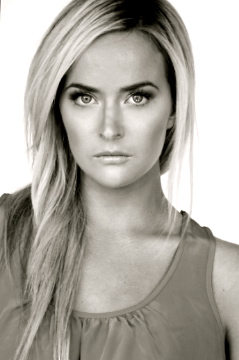
Rita Merson is passionate about her art, about the creative journey itself, and talks about some of the very important lessons she has learned in her life. Her film is centered on the message of being true to oneself, an empowering theme portrayed with both humor and sensitivity.
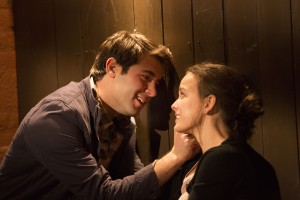 Q. What inspired you to take on this particular project?
Q. What inspired you to take on this particular project?
I wrote it 3 years ago not thinking I was even going to make it. I wrote it generally to make myself feel better after a little bit of a heartbreak. And I wanted to write something that was sweet and happy and romantic. So I went to Woodstock, New York, with friends and they were recording an album and I was really inspired by the town and in general inspired by upstate New York. When I started writing the movie, I really was chasing a feeling. And I wanted to create that ‘feel better’ experience. So the inspiration was really a feeling that I wanted to write about and experience myself and ultimately that I hope now the audience will feel when they watch it.
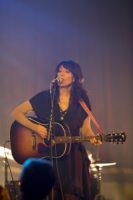 Q. The core theme is about being true to yourself, putting love first, following your heart, and getting back in touch with your roots. Is this theme very important to you?
Q. The core theme is about being true to yourself, putting love first, following your heart, and getting back in touch with your roots. Is this theme very important to you?
Yes, I think it is probably at this point in my life the most important theme in my creative work but also personally. I’m in my late 20s, and the experience of this decade of my life has made that pursuit very clear. That ultimately it’s finding who you are and being authentic to your voice, being authentic to your needs and authentic to your taste, this is real happiness, and that no matter what we chase on the outside, or what looks glamorous and shiny, the things that matter are very, very simple. And they’re very internal. Things like love, authentic pleasures, and engaging in activities that are real to you and not because someone expects you to act a certain way or do a certain thing. I’ve learned those lessons in my life. I’ve tried to make the movie as much about that as I could and hopefully that inspires people. At our screenings I certainly have a lot of girls that come up to me. The best feedback that I’ve gotten so far, is when girls in their late teens and early 20s take that from the movie and feel a sense of “I can have it all and I can do it my way and I don’t need to be anyone but who I am.” That’s real success and that brings the things we go on chasing — ironically!
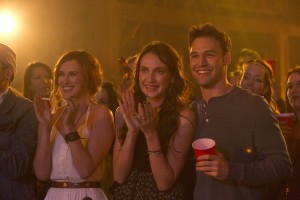 Q. There are a lot of contrasts in this movie: the shallow music industry in New York versus authentic, real music from the heart in Woodstock; the gritty bartender played by Rumer Willis versus Catherine’s sweet naïve character; Catherine versus Garret; Catherine versus the music business, etc. Was this a deliberate effort setting up these contrasts or did it happen naturally?
Q. There are a lot of contrasts in this movie: the shallow music industry in New York versus authentic, real music from the heart in Woodstock; the gritty bartender played by Rumer Willis versus Catherine’s sweet naïve character; Catherine versus Garret; Catherine versus the music business, etc. Was this a deliberate effort setting up these contrasts or did it happen naturally?
That’s a great question. It was very deliberate. It was deliberate in a multi-faceted way. It was deliberate in terms of writing it because it was the contrast that kind of sparked her transformation and sparked her journey but it was also aesthetically a contrast the way we lit the different worlds, the way we approached shooting the different worlds. Matt Irving shot the Woodstock vs. the New York scenes differently. He shot Woodstock all hand-held, and New York was much more structured and linear. Our colors were different. We definitely wanted to create two different worlds in every way we could. It was a commentary literally, but also symbolically, about the parts of us that are serving others and the part of ourselves that’s true and serving a higher purpose, the more authentic purpose in our lives.
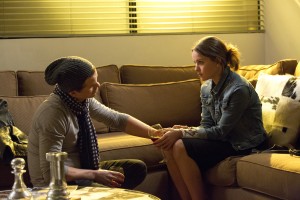 Q. I loved the scene where Katey Sagal gives some songwriting advice to Catherine and sings the song that she co-wrote with Catherine’s father. Katey seems very well cast as Lee Ann, plus she has a really great voice. Was it hard to find the right person for this role?
Q. I loved the scene where Katey Sagal gives some songwriting advice to Catherine and sings the song that she co-wrote with Catherine’s father. Katey seems very well cast as Lee Ann, plus she has a really great voice. Was it hard to find the right person for this role?
It was interesting because the original script had two singing roles that I basically blended together and created Lee Ann. So I tailor made the role for Katey when she was cast. It was hard in the sense that she is so talented and she’s so brilliant and so amazing and there was so much pressure to showcase her voice in a way that was authentic. We wanted the music moments to organically come into the movie and weave through but at the same time I wanted that special moment of her singing because she is so powerful and her voice is powerful and she is that kind of mentoring person. Even on set she had that presence and brought a certain amount of peace. There’s a lesson with her around this and it’s something very unique and special. In many ways Lee Ann is unique and would be difficult to cast, but because it was created almost for Katey it makes sense that it feels that way because I don’t think anyone else could have played her.
Q. Jason Ritter plays somewhat of a funny caricature of a narcissistic and shallow actor. Do you feel this way about actors or show business?
Well, [laughing] I’m not going to say that about all actors across the board!! But I have come across a few and have dated a couple that had elements of that character. I certainly based him on someone specific — I’ll put it that way. I won’t name names! Jason Ritter is truly one of the funniest, most brilliant people I have ever met and we were so lucky to have him. He’s so great to work with. He entertained us off camera and on and the whole crew fell in love with him. Everyone just adores him and he brought so much to Garret and to the role. He’s so funny. I pray that he does more and more comedy because he did brilliant. His mind is really brilliant. He was able to play a character of an actor but also just based it in reality and there were so many ridiculous moments and ridiculous things he was doing but there’s a truth to it. I always believe him.
Q. I loved the scene in the film where he (Garret) is on the treadmill looking at himself …
He did so much on his own. There are a lot of ad libs and parts of the movie. At screenings he gets so many laughs. Every laugh that he goes for he gets. We’re really lucky with him.
Q. Why Woodstock? Did any of the filming take place there?
We had a second unit go out there and capture different scenes of the countryside and the town, but, we shot the entire 20 days — really a fast shoot — in Los Angeles and downtown L.A. and a couple of other locations. So we didn’t shoot any scenes in Woodstock but we definitely worked hard to match the aesthetic and to capture as much of it as we could. And Woodstock… First of all, I think it’s just a catchy title, and it’s interesting and it’s a new perspective of it. It’s not at all about the festival, it’s about the town, and it’s not even about the town, it’s about the place inside. We all have a Woodstock. We all have a truth. We all have a creative, real, authentic place.
Q. Are you personally a folk music fan?
Yes, I love Joan Baez. I love all music. I’m a music lover and I grew up with it. My brother is a bassist and I grew up with pounding music from his room, loving the process, and always, as I write, I start with the music. So it’s a huge part of my process. I love folk music. I guess Bob Dylan would be my favorite of anything, and I definitely listen to him more than any other artist. So, there was a part of me that had an appreciation for it that sparked the film.
Q. Do you personally like small town life?
Well, I grew up in New York. Especially as a writer, there’s something about leaving the hustle and bustle and experiencing simplicity and quiet and serenity. That is for me more of a real life than the worlds we sometimes get lost in that are much faster. So, yes, I do…
Q. What were the main challenges, if any, in filming this movie?
The challenges were probably just what you would expect on an independent film, which is the budget. I look back on the movie and the original script had a big chunk of it that’s gone because we couldn’t financially shoot it and that’s tough because there’s parts of the movie I wish would help tell the story even though it works as it is. But, still, personally for me it’s hard also just maintaining the focus for so many years. I wrote it and 2 years later we were shooting it. So I have a very fast story of getting the movie made. But still, it’s a lot of time to be focused on one thing and there are so many hurdles and challenges along the way that to maintain that enthusiasm and focus and inner strength as a director, that was very challenging. But the shoot itself was really smooth. We were very lucky. We had great producers and an amazing cast and we had a pretty flawless shoot.
Q. What’s the next project for you?
I’m getting into the TV space. I’m not supposed to talk about anything specific but I am very excited about my next project. It’s a very different aesthetic and it’s a different energy. It’s a lot naughtier and a lot darker. It’s kind of a dark comedy that I am working on for TV and we’re incredibly excited to start.
Q. Do you have any advice for anyone who’s trying to make it in the (notoriously) difficult music industry?
My advice for a musician or anyone else trying to make it in anything is really the message of the movie, and also what I’ve seen work for the people around me, and my friends that have become very, very successful in their lives as musicians, as artists, as filmmakers, and as writers. It’s that real laser focus on your goals but also on what you are doing for the world with your talent when you have a higher purpose and when you are serving a higher good. You get a strength and a momentum that is very powerful. You have to put everything — all of the noise and all of the chaos around you — it has to move to the side and you just have to have that vision and know that there is a reason that your heart desires what it desires and there’s a reason why you want what you want and that reason has to drive you through all the things in the way. Ultimately, if you work very hard on what’s in front of you and give it your everything, you will get to where you need to get to. It will be better than you think, it will be bigger than you can even dream, but you have to let it. And letting it means being present, being focused, being driven by what’s right in front of you, and not letting anything that’s the opposite of your love for your craft get in the way.
Always Woodstock opens in theaters on November 14th.
